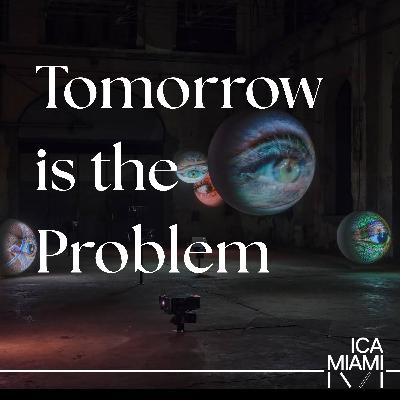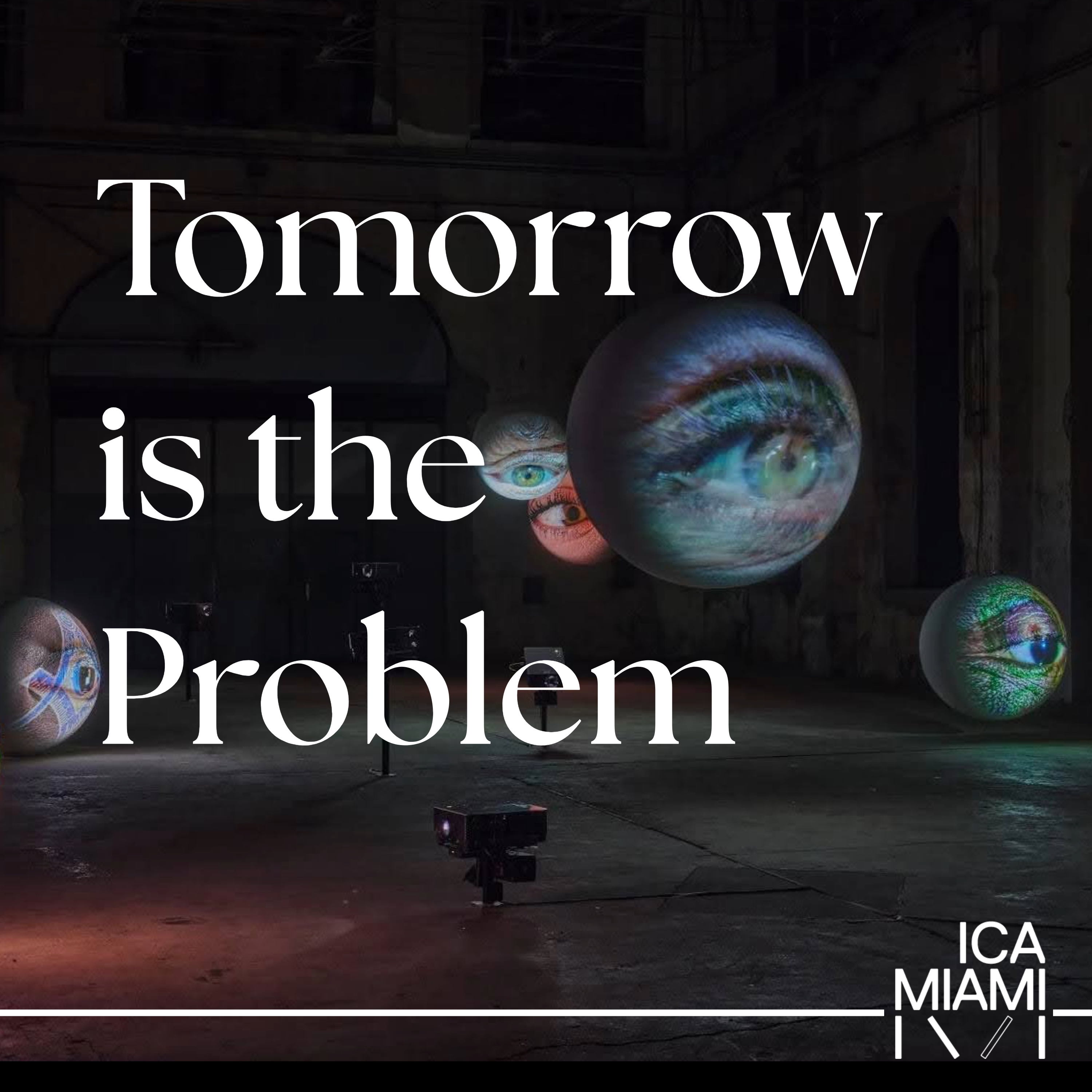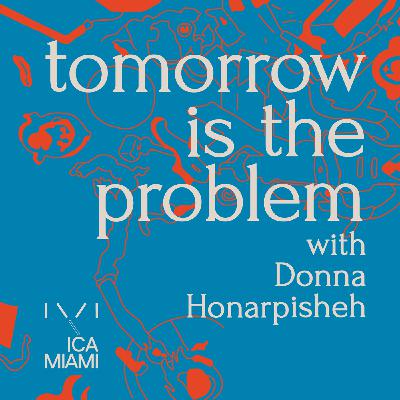Discover Tomorrow is the Problem: A Podcast by Knight Foundation Art + Research Center at the Institute of Contemporary Art, Miami
Tomorrow is the Problem: A Podcast by Knight Foundation Art + Research Center at the Institute of Contemporary Art, Miami

Tomorrow is the Problem: A Podcast by Knight Foundation Art + Research Center at the Institute of Contemporary Art, Miami
Author: ICA Miami
Subscribed: 4Played: 129Subscribe
Share
© ICA Miami
Description
Welcome to “Tomorrow is the Problem,” a new podcast from the Knight Foundation Art + Research Center at the Institute of Contemporary Art, Miami. Each season, join Dr. Donna Honarpisheh as she explores the hidden meanings behind everyday phenomena in an effort to better understand the most urgent cultural issues of our time.
24 Episodes
Reverse
Tomorrow Is The Problem returns! This season, we’re exploring the uncanny. Popularized by Freud in 1919, “the uncanny” describes a strange and anxious feeling, when something is familiar and yet alien at the same time. This season, join Dr. Donna Honarpisheh as she speaks to scholars and artists to explore how the uncanny manifests in the works of artists like Tony Oursler, Lorraine O’Grady, Adam Putnam, U5, and more.Tomorrow is the Problem is brought to you by the Knight Foundation Art + Research Center and is produced in partnership with FRQNCY Media.
Tomorrow is The Problem, kicks off its fifth season with a deep-dive into the groundbreaking work of conceptual artist, Charles Gaines. Over the course of his ongoing career, Gaines repeatedly revolutionized understanding of art: how it can be made, what makes it meaningful, and why art criticism consistently fails Black artists.
Host Dr. Donna Honarpisheh sits down with art historian and curator Ellen Tani, contemporary artist Edgar Arceneaux, and Charles Gaines himself to discuss Gaines’ prolific work.
Tomorrow is the Problem is brought to you by the Knight Foundation Art + Research Center and is produced in partnership with FRQNCY Media.
Zapatista Orchestration recording courtesy of Charles Gains and the Hammer Museum.
Tomorrow Is The Problem, is back!
This season, Dr. Donna Honarpisheh will explore the works of three conceptual artists: Charles Gaines, stanley brouwn, and David Medalla. Tomorrow is the Problem is brought to you by the Knight Foundation Art + Research Center and is produced in partnership with FRQNCY Media.
What does it mean when “fake” images are indistinguishable from “real” ones? The rapid rise of AI generated images and advancements in VFX and photo manipulation has made it harder for us to distinguish between authenticity and artifice, animate and inanimate, fact and fiction. In this week’s episode of Tomorrow Is The Problem, host Dr. Donna Honarpisheh sits down with media historian, theorist, and associate professor in culture and media studies at the New School, Deborah Levitt and artist Adam Putnam to explore the tense, evolving relationship between AI, the uncanny valley, and the body. Tomorrow is the Problem is brought to you by the Knight Foundation Art + Research Center and is produced in partnership with FRQNCY Media.
The uncanny is an unsettling experience, bringing to light that which has been hidden underneath the surface. Artist Lorraine O’Grady is an agent of this unsettling effect. Throughout her prolific career, Lorraine O’Grady has used her art to challenge boundaries imposed upon Black Artists and to problematize binary thinking. In this week’s episode of Tomorrow is the Problem, Host Dr. Donna Honarpisheh sits down with Dr. Stephanie Sparling Williams, the Andrew W. Mellon Curator of American Art at the Brooklyn Museum, and Harry Burke, an art critic and PhD candidate at Yale University, to discuss Lorraine O’Grady’s work.Audio excerpts of Lorraine O’Grady from the 2018 Soul of A Nation symposium, an event hosted by the Tate Modern and Crystal Bridges MuseumTomorrow is the Problem is brought to you by the Knight Foundation Art + Research Center and is produced in partnership with FRQNCY Media.
You have a data ghost. The excess of information we share online – photos, posts, messages, locations – creates a digital doppelganger that blurs the line between human and non-human, living and dead. Artists like U5 and Bill Viola reckon with this excess of image, data, and self-surveillance creating works that grapple with the uncanny in its digital manifestations. In this week’s episode of Tomorrow Is The Problem, host Dr. Donna Honarpisheh sits down with anonymous artist collective U5 member, Berit Seidel and Kris Ravetto-Biagioli, a professor of cinema and digital media at UCLA, to discuss surveillance technology and the digital uncanny in the works of U5 and Bill Viola.Tomorrow is the Problem is brought to you by the Knight Foundation Art + Research Center and is produced in partnership with FRQNCY Media.
Tony Oursler, a multimedia and installation artist best known for his distorted video projections, which explore the tension between technology and the supernatural. Tracing the manifestations of the uncanny across technological advancements from puppets and telegraphs to modern and contemporary video art, this episode establishes the relationship between the uncanny and technology and shows how it develops across media forms. In this week’s episode of Tomorrow is the Problem, host Dr. Donna Honarpisheh sits down with Jeffrey Sconce, film professor at Northwestern University and author of the book Haunted Media: Electronic Presence from Telegraphy to Television, and internationally renowned video artist Tony Oursler himself to discuss his work.Music Selections by Tony Oursler: Sound digressions in 7 colors, Red oweb, Green oweb, Magasin, Influence Machine, Black owebTomorrow is the Problem is brought to you by the Knight Foundation Art + Research Center and is produced in partnership with FRQNCY Media.
Our season concludes with a discussion about David Medalla, an internationalist who – much like his work – resists easy categorization. Best known for his kinetic sculpture series Cloud Canyons, David Medalla’s whimsical art invites people to see beyond borders and limitations.
Jane England, the director and founder of the gallery England Co, and Contemporary Art Professor at McGill University Chanon Kenji Praepipatmongkol join Dr. Donna Honarpisheh to discuss the life, philosophy, and art of David Medalla.
Tomorrow is the Problem is brought to you by the Knight Foundation Art + Research Center and is produced in partnership with FRQNCY Media.
stanley brouwn is one of the most enigmatic and elusive artists of this century. brouwn created performative conceptual experiments in identity, perception, scale, and relation, among other topics. Almost as important as his conceptual practice is his refusal to share biographical information and requests for his work to never be photographed, replicated, or even analyzed. In other words, what we don’t know about brouwn is almost as important as what we do know.
Host Dr. Donna Honarpisheh is joined by Adrienne Edwards, the Ingalls Speyer Family Senior Curator and Associate Director of Curatorial Programs at the Whitney Museum, E.C. Feiss, Assistant professor of modern and contemporary art at Providence College, and writer, art historian, and editor, Annie Ochmanek to discuss this enigmatic artist.
Tomorrow is the Problem is brought to you by the Knight Foundation Art + Research Center and is produced in partnership with FRQNCY Media.
This last episode of the season is dedicated to a singular artist whose layered portrayal and use of humor to relate to issues of belonging, home, racism, and brutality are part of a lifelong dedication to telling stories.
Haiti’s relationship to time goes back and forth along a spiraling line that repeated patterns while identifying them. Artists have long played a role in calling out failings and offering paths to rectifying trajectories.
In the face of mounting crises, who will listen to the voices of the past and the call for home-grown resilience?
The fractures left by inside and outside forces following Haiti’s double revolution against racial slavery and colonialism are still felt today. Analyzing history through a contemporary interpretive lens empowers a nuanced narrative that informs the present moment.
It also reminds the present of the potential of revolution.
Haiti has had a definite role in shaping the Miami cultural and physical landscape. As we explore the growing root system that gives rise to the singular cultural hub that is Miami, we dive into both its diasporic past and the climate changes its future is signaling.
Art functions as a perception prism, aiming to divert and change how we experience our world. As psychedelics take root in white America, an appropriation shift occurs.
From meditating with paintings, to representations of altered states, we probe the nature of the relationship of the artist with themselves and with the viewer and finally between art and our senses.
From a young age, Betye Saar collected objects as a form of ritual, to hone their energy and activate their spirit. To protect and potentialize them.
Today’s episode explores ritual as a methodology for healing and power. From the ritualization of Betye Saar’s installation sites to the reclamation of the black body by Krista Franklin we follow, and deconstruct the Brookes Ship.
Etel Adnan’s art practice exists outside of traditional notions of time and spaces. She paints and writes a broader objective view of the cosmos all while wrestling with the everyday.
Today’s episode explodes out of time and follows repetition and meditation rituals as anchors for the therapeutic process. From letting go of the written word, to painting, to reclaiming a voice amid the chaos of war, we look at Etel Adnan.
With the African Diaspora came Yoruba, Kongo, the Orishas in their richly pluralistic forms as well as a great many other cultural and spiritual influences.
From ancestral means of worship to the blurry lines between art and ritual, two cuban artists share their experience of Santeria and ritualistic practices in their art, community, legacies and timelines.
The somatic experience of sound is inspected from its potential for violence and torture to the transcendence of healing, by way of its actual physical form.
A discussion on the ambiguity of the human relationship with sound through science, technology, and spirituality.
Improvisation is the shaping force of jazz, but as it shapes jazz it also structures community, and enables resistance.
Today’s episode explores where jazz finds its roots and how far it sends its shoots.
For our season finale we offer hot, crunchy, gooey sounds!
We discuss the ethics of sound and how the old lexicons of sound have trained our cognitive biases to hear in racialized, gendered, and classist terms.










